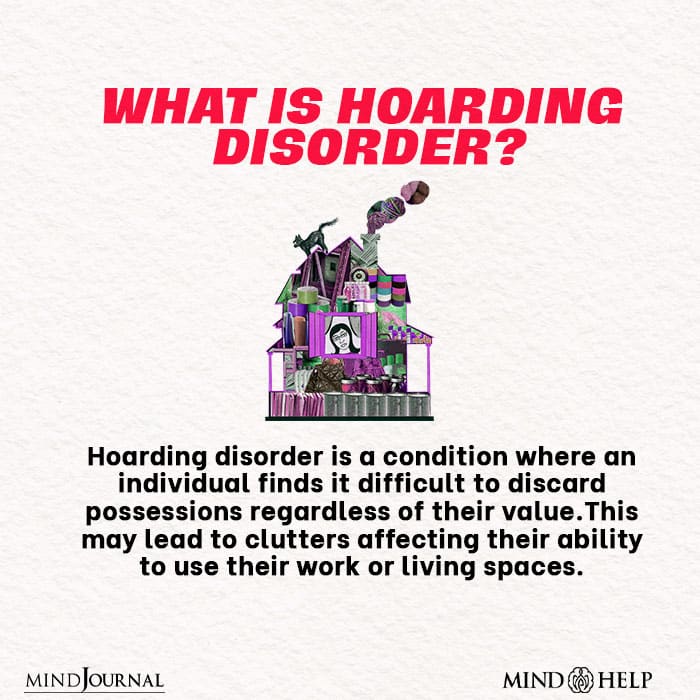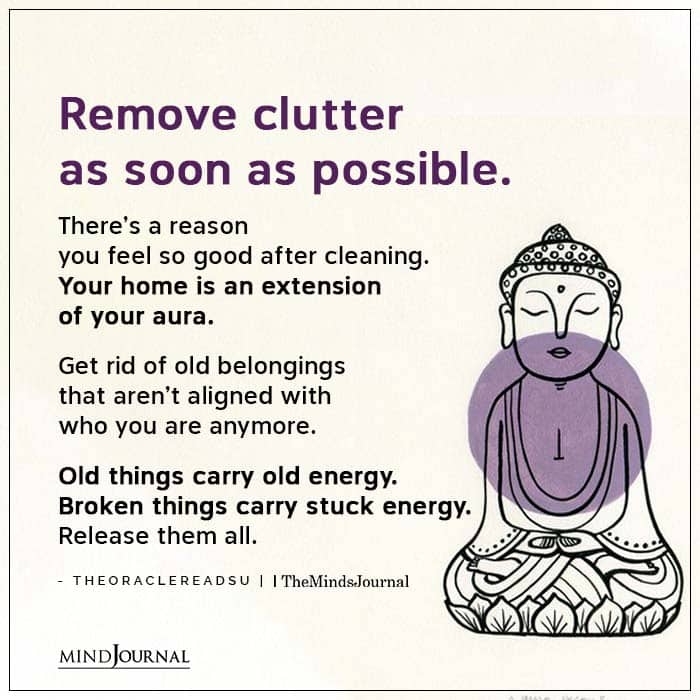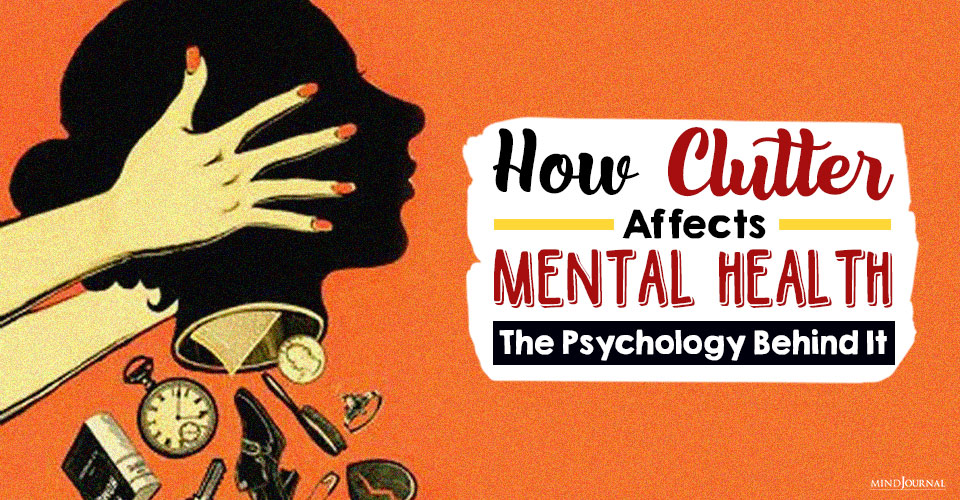Our mental health can be triggered by various things but ever thought about how clutter affects mental health?
Well, do you have dishes in the sink, mounds of dirty laundry piled up, closets in disorder, too much garbage in the garage, or an overwhelming number of unwanted things scattered about the house?
And are you getting little done because of living in clutter and the distractions it creates? Does it make you become annoyed when things aren’t in their right place?
If you answered yes to any of these questions, you need to know why clutter is bad for you and how living in such conditions is unhealthy. There are many reasons why clutter affects mental health and your sense of well-being. Let’s take a closer look at why and how you need to declutter your life.
But before we get into the effects of living in an untidy house let’s learn more about the different types of clutter you may possess and how clutter affects your mental health.
5 Types of Clutter
1. Physical clutter
This is the most common type of clutter that most people have. It consists of piles in drawers, closets, etc. It could be a home that has unnecessary items like showpieces that are hoarding up the space. It could be a work desk with piles of files, unnecessary stationery that might not be even useful anymore.
The reasons we allow clutter to fester and grow is because of our perceived lack of time, not having a designated place to store them, or because we can’t let go of it. However, physical clutter affects mental health severely and we tend to become erratic or hoarders when dealing with such situations.
2. Digital clutter
While reading this article, do you have thousands of unread emails in your inbox or 10-15 browser tabs open in the background? Then you are dealing with digital clutter.
Digital clutter, in layman’s terms, is the disorganization of data, files, and digital gadgets. It can take various forms, such as phone storage that is full, or hundreds of emails or files on the desktop. Digital clutter not only slows down gadgets, but it can also slow you down. This kind of mess can easily make you feel overwhelmed and stress you out.
3. Mental clutter
Like physical clutter is something that makes our home untidy and overwhelmingly messed up, mental clutter is something that makes our minds full or makes certain things more difficult, especially when we deal with it every day.
A cluttered brain can make it harder to focus on one thing at a time because the brain is stretched in so many different directions. This can even affect sleep.
Related: 5 Tips That Can Help You In Freeing Up Your Mental Space
4. Emotional clutter
We all experience or feel emotions that we don’t always manage well. These feelings have a variety of effects on our life. It can manifest in terms of negative patterns and beliefs we don’t even realize we’re carrying around.
It can include resentment, anger, insecurities, guilt, or shame. Emotional clutter affects mental health of individuals as the mind is preoccupied with things in the past and it leads one to become depressed or anxious.
5. Spiritual clutter
Spiritual clutter includes the thoughts and ideas that take up most of our time and energy. It could be a lack of peace or not being able to forgive. These negative thoughts about ourselves and others or worries over things we cannot change is a kind of clutter that affects our mental well-being and reduces our ability to focus on more important things in life.
What does clutter do to your brain and body?
Clutter is detrimental to mental and physical health. It may appear that overflowing cupboards and stacks of paper placed throughout the house seem harmless. So, how does clutter affect the brain function or mental wellness?
According to research, being disorganized or having clutter has a cumulative effect on our brains. Our brains like order, and constant visual reminders of disarray deplete our cognitive resources, limiting our ability to focus. That’s why feeling cluttered is a sign of cognitive overload and it can reduce the focus of working memory.
6 Psychological Effects of Clutter on Your Mental Health

Have you ever considered the psychological reasons for clutter or factors that contribute to it? It appears that there is a scientific explanation for the unpleasant emotions we experience when surrounded by clutter, as well as feelings of satisfaction and calm we experience after decluttering our space.
But before we get into this, let’s take a look at how clutter and mental health go hand in hand.
1. Increased stress rate
Clutter affects mental health in many negative ways, one of which is making us feel more stressed. According to studies, people who live in cluttered spaces or describe their home as messy have greater levels of cortisol, a stress hormone. It’s difficult to relax when our home is a place we don’t like going to because of the mess.
2. Overstimulation
When we live in a messy environment, the continuous clutter affects mental health and overstimulates our minds. Our brains can only process a certain amount of information at a time or for a short period of time. Overstimulation can have a bad impact on memory and cognitive function. Every day, taxing the brain in this way becomes weary and might have a negative impact on health.
3. Feelings of inadequacy or shame
Having a house that is well-kept is a sign of “being on top of the game or having it all together.” As a result, cluttered environments can lead to low self-esteem. And unorganized living spaces have indeed been linked to depression. This is one of the many social effects of clutter.
So there are many ways in which clutter affects mental health, but the most detrimental thing about surrounding ourselves with clutter is that it reinforces our thoughts and directly reflects whether we feel worthy or not.
4. Distracted or lack of focus
A person’s ability to focus and concentrate can be negatively affected by clutter and a messy environment. A room with many objects and untidiness requires more sensory inspection, making it difficult for a person to focus on a single object or task. It can even instill fear and disgust in a person when they see dirty items lying around. This is just one of the many ways that clutter affects mental health and causes us to feel uneasy.
5. Behavioral effects

Individuals with clutter in their living spaces may develop a hoarding disorder. This condition causes a person to save haphazard items that they refuse to discard. They store them in a disorganized manner to the point where their surroundings can become extremely dangerous.
6. Social Isolation
Another way that clutter affects mental health of many people is by making them socially alienated from their surroundings. This is due to a sense of shame or humiliation about the status of their home or life in general.
We all require a certain amount of social engagement to maintain psychological wellbeing. Locking oneself up for extended periods of time out of shame will not solve problems; it will simply aggravate them.
Related: 3 Overlooked Ways To Boost Mental Health
Benefits of Decluttering Your Life

All of the physical and mental clutter can disrupt your flow, impairing your ability to move and think. But when you declutter your space, it could make you healthier and happier. It’s what studies call the “clutter effect” that can also affect your well-being.
Hence, recent research on stress, physical health, and cognition all point to the benefits of simplifying the clutter in your life. Below are a few benefits and effects of decluttering which can simplify your life effectively.
- Clutter affects mental health but decluttering your space can help you feel more confident and capable. It will give you the ability to solve problems and make decisions.
- When things feel out of order, decluttering your immediate surroundings is a great way of reducing stress, resulting in a relaxed state of mind.
- You will feel more energized and motivated to finish other tasks which helps you move towards your goals.
- It will help foster a healthy relationship among the family or friends and will reduce the stress levels.
Related: 15 New Skills To Learn For Rapid Self-Improvement
Things You Can Do to Declutter Your Life
Many individuals suffer from the mess in their homes and are unaware of how clutter affects mental health or the negative impact it has on physical well-being. At first sight, excessive clutter may appear harmless, but there are many negative effects on mental health as mentioned above. If clutter affects mental health of you and your near surroundings, here are some suggestions on how to improve and maintain it.
- Reduce your commitments and identify a few that you truly want to do and get rid of the rest.
- Write down all of your weekly and daily obligations, chores, and tasks, and then plan out how you will complete them.
- Start by clearing off anything that is on the floors. Throw out or donate unused things.
- Organize the things you’ve decided to keep into drawers, cabinets, or closets in a neat way.
- Clear your unread and spam emails one by one. Delete unnecessary data or files that you don’t need.
- Lastly, learn to let go of consuming thoughts with acceptance and compassion.
Related: 5 Good Hobbies that can Improve Your Mental Health
The Bottom Line
We hope you learned the importance of how clutter affects mental health and how you can improve it. You will find yourself less stressed and happier if you’re surrounded by less clutter. So start today and start small. Begin with cleaning up stuff and get organized!
References
Evans, G. W., Wells, N. M., Chan, H. Y. E., & Saltzman, H. (2000). Housing quality and mental health. Journal of consulting and clinical psychology, 68(3), 526.
Maycroft, N. (2009). Not moving things along: hoarding, clutter and other ambiguous matter. Journal of Consumer Behaviour: An International Research Review, 8(6), 354-364.
Leavitt, F., & Katz, R. S. (2011). Development of the mental clutter scale. Psychological reports, 109(2), 445-452.
https://www.verywellmind.com/decluttering-our-house-to-cleanse-our-minds-5101511
https://www.psychologytoday.com/us/blog/fulfillment-any-age/201705/5-reasons-why-clutter-disrupts-mental-health
https://anzmh.asn.au/blog/mental-health/link-between-clutter-and-mental-health
Frequently Asked Questions (FAQs)
What does clutter say about you?
A cluttered or messy room can be caused by a variety of factors. It could indicate that you are too busy to clean and organize, or that there is a serious issue in your life that needs to be addressed.
Is a messy house a sign of mental illness?
Many individuals have mess in their homes and are unaware of how clutter affects mental health or their physical well-being. Excessive clutter may appear harmless, but it can lead to stress, high levels of anxiety or depression.
Why does clutter give me anxiety?
Clutter affects mental health in many negative ways, one of which is making us feel more anxious and stressed. It’s difficult to feel relaxed when our brain is constantly given a signal that our work is incomplete.











Leave a Reply